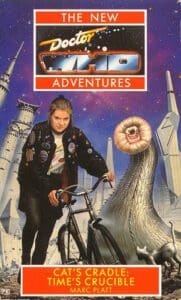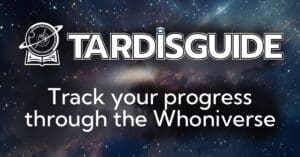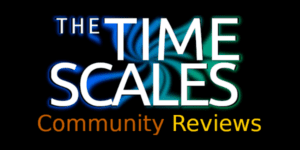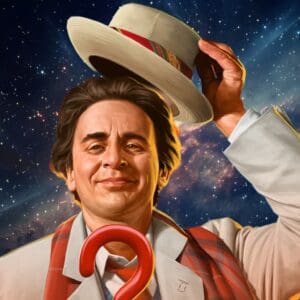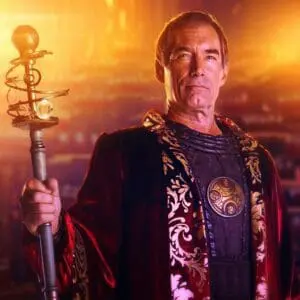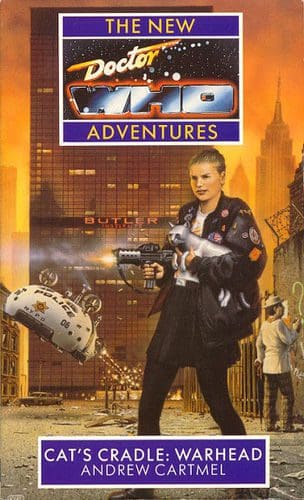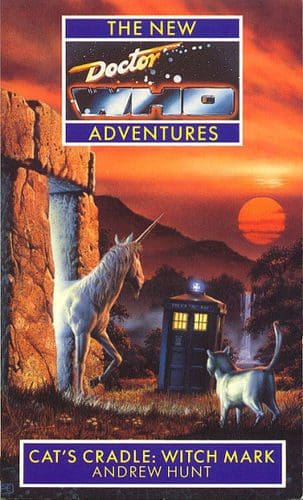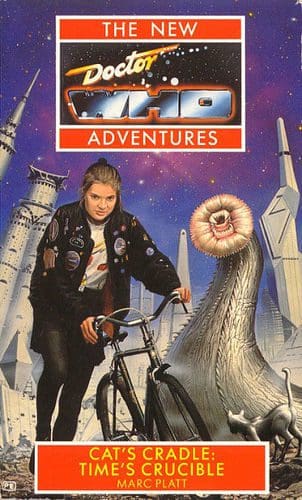
Virgin New Adventures
Cat’s Cradle: Time’s Crucible
Reviews and links from the Community
This review contains spoilers
Review of Cat’s Cradle: Time’s Crucible by beqowl
The Review… of Rassilon!
This was a book that took a little while for me to get into (and in fact I was really pushed into reading it out of wanting to join the book club (https://forum.tardis.guide/t/book-club-cats-cradle-times-crucible/2380), and the book club conveniently being on it), but in the end, it was also a book I rather enjoyed.
Ace’s journey through the book was really interesting to read, and I’m rather glad that we got to spend some time in her head and get to know some of her thoughts about the Doctor and the situation in general. It’s easy to get frustrated with the Doctor at times, and especially when we’re seeing how he acts or doesn’t act, or withholds information and gives off an air of distrust with Ace while he is still in the Wilby state of his mind, and I think it was a very sweet moment when Ace has just seen her guard counterpart fall off the tower and die, and the Doctor comforts her and promises never to let it happen to her. It emphasises the paternal and comforting charm I think the Seventh Doctor holds for a lot of people, and I would have loved to have seen it on screen.
Something about Doctor Who that has always fascinated me, and that i’ve always really wanted to learn more about, is the history and politics and culture of Gallifrey, and I think Time’s Crucible does a nice job at introducing concepts which (as of writing this, I’ve not read any further in the VNAs other than CC:TC) I believe get explored later in other books including Looming, the Other, and other aspects of the Cartmel Master Plan. What I learnt in this book surprised me a bit, as I’m much more used to modern Doctor Who, and so seeing an ancient Gallifrey being ruled by a Priestess, which has slavery and an empire and Gallifreyan sacrifices had me absolutely enthralled. I want to learn more about it, and genuinely would be happy to read some of the ancient Gallifreyan history books if they existed in real life.
As it happens, I’m also a pretty big fan of Ghost Light, which is also by Marc Platt, and while I found this story pretty confusing at times (even now I’m struggling to picture what the TARDIS World City looked like, and trying to get an accurate mental image of the Processes), it was thoroughly a Doctor Who story, and if it was something that was able to be translated to screen I’d be more than happy to give it a watch.
One part in particular stands out to me, and that is when the Older Shonnzi(?) is being made into a guard:
‘The younger Process spat Shonnzi Phazel’s scream of anguish out of its mind like chewed bones. It pulverised his thoughts with its own. Their content was irrelevant. It was still hungry.’
This little passage just left me feeling a tiny bit chilled, as I really can’t get the thought out of my head that the Process ate and destroyed his soul. (I understand that we learn later this doesn’t happen, but the feeling remains) On the Process, I enjoyed its weird way of speaking, and got the thought later on (I imagine this is meant to be the case, but I’m thick) that perhaps that it might be linked to the Pythia as she spoke in a similar way a few times.
Anyway, with all of this said the final judgement: 3/5!
I did enjoy this book a decent amount, but it took me a long time to get started on it as the beginning was not that interesting to me, but in fairness that might be my own fault.
Review of Cat’s Cradle: Time’s Crucible by Melting_Snowman
Worthwhile for extensive reading
There's a large stretch of this novel at the end which is rather brilliant, and in general I found the entire last half to be rather gripping. The first half, however, is quite slow, and the whole book is a challenging read. Not challenging like Shakespeare's Julius Caesar, but rather like an overly literal and scholarly translation of an ancient text where you have to look at the footnotes at the end of every sentence...
Part of the problem, if you ask me, is down to the ideas being very visual. The book is adapted from a TV story Marc Platt pitched to Andrew Cartmel that was rejected on budgetary grounds. Honestly, I could see a TV version of this being brilliant, but it just doesn't come across well in prose.
Marc Platt had previously written Ghost Light for televised Doctor Who, a very interesting story that I defy you to understand on your first viewing. It's very dense and clearly it's about a lot of things; what those things are, I'm still not quite sure to this day (but then again, I've not seen the extended version, or read the novelisation, or the shooting script). This novel doesn't suffer from the same time constraints of Ghost Light (quite the opposite—as I noted, the first half feels quite slow), but Platt still isn't interested in dwelling on any idea or explanation for longer than is strictly necessary, so if you do get confused, don't be afraid to look back over what you've read and take a moment to think about it before moving on.
This book is a worthwhile read, despite sometimes being a bit of a challenge. It is quite confusing in places, but at the same time, this is the first time we get any clear insight into Gallifrey's history, and my my, what an insight. We learn a lot about Rassilon and his rise to power, and we get hints at the mysteries surrounding the Doctor that came up during the Sylvester McCoy era of televised Doctor Who, which will continue to play into the VNAs from this point.
I think, really, the biggest flaw with this novel is that it directly followed Timewyrm Revelation. If it hadn't, it would be seen as a revolutionary experiment in what a prose Doctor Who story can be.
That said, I can't honestly imagine a version of the A-plot written as a novel that would have come off particularly great. The Gallifrey-focused B-plot is absolutely riveting every time it comes up, but I don't think that makes up even one sixth of the published book's length.
I can't recommend it as a standout, but its ideas are interesting, and the whole B-plot is glorious.
Recommended background: Remembrance of the Daleks (season 25)
Worthwhile background: An Unearthly Child (season 1; watch Part 1 only), the Edge of Destruction (season 1), the Three Doctors (season 10), the Brain of Morbius (season 13), the Deadly Assassin (season 14), Arc of Infinity (season 20), the Five Doctors (special), Silver Nemesis (season 25), Remembrance of the Daleks (novelisation)
In my reviews, particularly of the Virgin New Adventures, I prefer to use a 4-tier system of grading:
Essential reading - If you want to read all the best VNAs, get all the most memorable story arc beats, and generally enjoy the VNAs without having to trudge through the mediocre/bad books, or perhaps even if you just want to pick up a good Doctor Who book with no intention of reading the entire series, look for this rating.
Worthwhile for extensive reading - Not outstanding, but I won't outright tell you to skip it if you want a sense of the VNAs overall. If you're determind to only read the best, skip these, but for a read-through of the series, I wouldn't skip them. They're the worthwhile, good-but-not-amazing books. You'll get a stronger sense of character arcs, story arc beats, and the growth of the VNAs as a range if you read these, but it will also take you a lot longer.
Not recommended - Not very good. If you really want to maximise your experience of the VNAs, you could read this, but it's definitely not advised.
Avoid at all costs - An irredeemable lump of human fecal matter. Do not waste your time with this insult to the franchise.
In addition, I list Recommended background that you may find necessary for understanding the story in full, as well as Extensive background for some additional details you may find interesting.
This review contains spoilers
Review of Cat’s Cradle: Time’s Crucible by PalindromeRose
Virgin New Adventures: Cat’s Cradle Trilogy
#005. Time’s Crucible ~ 4/10
◆ An Introduction
The last time I attempted to journey through the ‘New Adventures’ range was a complete failure, as I found myself giving up about half-way through the fifteenth novel. I realised I would need to put some strategies in place this time round, lest I become so bogged down at the idea of marathoning sixty-one novels. So here’s what I’m doing;
- Whilst reading one of the novels, I will have a ten hour long video of ambient sounds playing through my headphones to help me focus. Otherwise, I’d take every opportunity to procrastinate and replay Grand Theft Auto IV.
This strategy appear to be working so far, because I actually feel enthusiastic about reading a novel that gave me a blinding migraine the first time round! It’s been about five years since I last touched this book, so here’s hoping I can have a bit more fun with it now.
◆ Publisher’s Summary
"You're on your own, Ace."
The TARDIS is invaded by an alien presence, and is then destroyed. The Doctor disappears.
Ace, lost and alone, finds herself in a bizarre deserted city ruled by the tyrannical, leech-like monster known as the Process.
Lost voyagers drawn forward from Ancient Gallifrey perform obsessive rituals in the ruins.
The strands of time are tangled in a cat's cradle of dimensions.
Only the Doctor can challenge the rule of the Process and restore the stolen Future.
But the Doctor was destroyed long ago, before Time began.
◆ The Seventh Doctor
Despite taking a break from the action in ‘Time’s Crucible’, the Seventh Doctor is still extremely well written. This should come as no shock though, as Marc Platt actually got to write for the character during Season 26.
The Doctor had only occasionally remembered that things needed replacing or servicing, or they wore out completely. Even within the Tardis, time still took its toll. He seemed to have been wearing the same jacket and paisley scarf for at least the past month relative time, but they never looked any worse for wear. He normally slotted naturally into any situation, however bizarre, from alien ice cave to Victorian dinner party. The Doctor was outwardly a clownish eccentric, a genius in human terms, but that was just the bit you were allowed to see. An alien with a Scottish accent. Travelling through time and space with him, Ace had had the chance to look closer, and through the occasional cracks in his veneer, she glimpsed a darker, huger intellect. It seemed very alien, detached and powerful, as if the Doctor was just something the intellect went about in. Sometimes the darkness seeped from the cracks and those it touched might get hurt. Ace had learnt from her own bruises that no one who met the Doctor was left unchanged. Yet he was kind, compassionate, spiky and often angry; vulnerable to all mortal foibles. But that might be deliberate. He embraced them eagerly as if they were toys. Lingering on one world or another, as if to play them out or test their capacity. He was just as dangerous as the evil he attracted and opposed.
◆ Ace
For all its flaws, I must praise ‘Time’s Crucible’ for giving a substantial amount of the action to Ace. This is a really good adventure for her. Platt previously wrote for the character in ‘Ghost Light’, which is still considered to be one of her best adventures. His writing for her is simply excellent.
Ace had instinctively renamed the ship’s food dispenser in revenge for the Doctor’s persistent use of pseudo-jargon and alien folklore, stuff she had to pretend to understand. Her aversion to cats, especially black ones, had only recently developed. It wasn’t an allergy, they just brought out the worst in her; feelings she didn’t talk about.
◆ Story Recap
Ace awakens to find herself in a bizarre alien city where it’s always dusk. Buildings of impossible geometry rise on a horizon that never seems to stop, while rivers of liquid mercury segment the area into three distinct zones.
It soon transpires that this city is actually the Tardis, turned inside out after crashing into a prototype time-ship from Ancient Gallifrey! The Chronauts, the crew of said prototype time-ship, now find themselves acting as slaves to an invading alien known only as the Process.
With the Doctor nowhere to be found, it is up to Ace and the Chronauts to save the day… somehow.
◆ Incoherent Ramblings
I have a huge amount of respect for any writer that wants to do something experimental and elaborate, but ‘Time’s Crucible’ is what happens when coherence goes out of the flaming window! I remember reading this novel for the first time five years ago, because it was an incredibly warm day and I was sat on a sun-lounger in the back garden. I thought my blinding headache that day was from heatstroke, turns out it was actually down to the incomprehensible writing in this adventure.
Half of the prose in this novel is pretentious beyond belief, whilst the other half is mind-numbingly boring. Atrocious is honestly the best way I can describe the writing for this novel. If you still want to experience a surreal and trippy Marc Platt adventure, then I direct you towards the Series Six finale of the ‘Fourth Doctor Adventures’. It delves deep into the history of Ancient Gallifrey whilst also exploring Funderell – a planet whose surface is like set custard, where you have to keep moving lest you sink into the still sea. It would be a much better use of your time if you listened to ‘The Skin of the Sleek’ and ‘The Thief Who Stole Time’, because they are phenomenally well written.
◆ Ancient Gallifrey
I’d like to discuss the excellent secondary plot of ‘Time’s Crucible’. Ancient Gallifrey was a highly superstitious place, ruled over by a matriarchal seer known as the Pythia. Nearing the end of her reign, the 508th Pythia was unable to see into the future, and found herself being taunted by her greatest opposition – Rassilon, and his clan of Neo-Technologists – who predicted an end to her empire of superstition.
During the events of this adventure, the Doctor is forced into psychic communion with the Pythia, and is forced to tell her that she would be the last of her kind. Realising that her reign was drawing to a close, the final Pythia sent her followers to the planet Karn and threw herself into the abyss below her temple. Her exiled followers would gradually become the group we know as the Sisterhood of Karn.
But before committing suicide, the Pythia put a curse sterility onto the people of Gallifrey. The curse’s effect was immediate: fetuses perished in their mothers’ wombs, including Rassilon’s own daughter; and no new children were born on Gallifrey. Faced with extinction, the whole planet united behind Rassilon and adopted technological innovations such as genetic Looms, regeneration and time travel, which enabled them to survive despite the restrictions of their curse. This secondary plot surrounding Ancient Gallifrey is the most interesting thing about ‘Time’s Crucible’, and I brought it up because it will play a crucial part in perhaps the most well known Doctor Who novel of all time… but we’re a hell of a long way off reviewing ‘Lungbarrow’. Just keep it in the back of your mind for now.
◆ Conclusion
“The Process is only beginning.”
Well dip me in mustard and call me a hot dog! The writing for ‘Time’s Crucible’ is still utterly atrocious, even five years after the first time I read it. This novel is so ludicrously pretentious that I got a blinding headache from reading it, so I’m thankful that I had some paracetamol nearby.
‘Time’s Crucible’ carries two distinct plots. The first focuses on Ace and the Chronauts attempting to fix whatever has turned the Tardis inside out, whilst also dealing with a giant alien lamprey. The second plot focuses on Ancient Gallifrey during a time of great upheaval. The Pythia, then matriarch of Gallifrey, sent her followers to the planet Karn, issued her curse of sterility on the Time Lords, and then committed suicide by throwing herself into the abyss below her temple. The stuff on Ancient Gallifrey is incredibly interesting, and I probably would have given this book a higher rating had it been the entire focus of the adventure!
Some people will look more favourably on this novel and claim that Platt was being some form of maverick experimental genius. On the other hand, I think he had his head so far up his backside whilst writing ‘Time’s Crucible’ that he was choking on his own gall bladder!
Community Ratings
(Updates coming soon:)
Add the last X members who rated it here
Add number of Favs, and who they are, here
